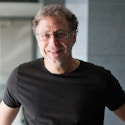By clicking to watch this video, you agree to our privacy policy.
On September 16, 2020, Emmanuel Mignot discussed sleep biology as well as sleep disorders and their impact. He presented a link to what is known on the genetics of sleep and sleep disorders. He emphasized the need for large scale objective sleep recording studies with genomic and proteomic analysis to better understand the molecular pathways regulating sleep and circadian biology.
His talk was part of the Simons Foundation Autism Research lecture series.
About the Lecture
Sleep as a phenotype has advantages as a research subject over other central nervous system behaviors. Sleep is objectively quantifiable in humans and animals. Sleep is clinically significant to many neuropsychiatric conditions (including autism) and general health issues, with causality starting to be evidenced by genetics. Additionally, sleep research and medicine are uniquely positioned to benefit from ongoing technological revolutions such as hardware miniaturization, large-scale genetic and proteomics, animal models, deep learning and other statistical interpretations.
In this lecture, Emmanuel Mignot first presented the basis of sleep biology as well as the most frequent sleep disorders and their impact. He explained how these disorders and sleep characteristics are currently monitored in sleep laboratories and how they are interpreted. He provided an example showing how supervised deep learning of electroencephalogram (EEG) signals can be used to imitate human scoring of sleep stages or events with more reliability and to discover new phenotypes and new applications.
From there, he presented a link to what is known on the genetics of sleep and sleep disorders, explaining the current gap — the fact current studies have only used subjective reports of sleep and sleep symptoms. The need for large scale objective sleep recording studies with genomic and proteomic analysis was emphasized. Such studies and analyses would allow for the understanding of molecular pathways regulating sleep and circadian biology. He pointed out that proteomics allows for the creation of multivariate models that can correlate with complex physiological phenomena such as organ function, aging, sleep debt or circadian phase. To ensure complete convergence of these technologies, a need exists for designing a complete, easy-to-wear, at-home sleep disorder hardware evaluation system. Such hardware is feasible and could happen soon with existing technology.




